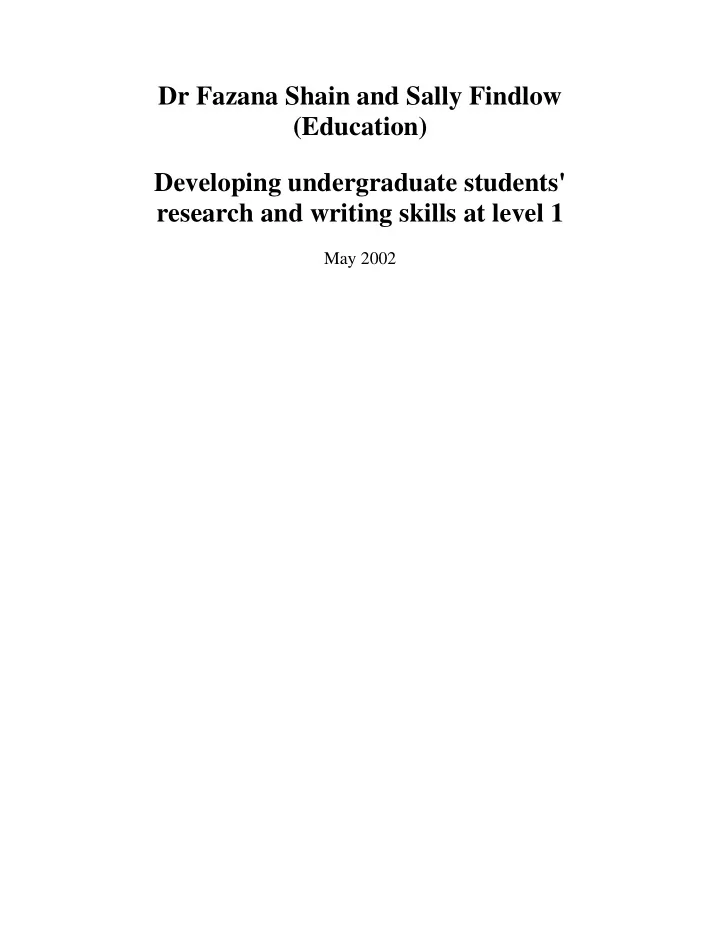

Dr Fazana Shain and Sally Findlow (Education) Developing undergraduate students' research and writing skills at level 1 May 2002
Aims ! To strike a balance between promoting authentic writing as communication and imparting some basic composition tips ! To provide support for first-year students making the transition from school-level modes of study to university level ! To help overcome linear (one-off) notions of marking, grading, assessment etc. ! To provide a forum for exchange of study/writing/reading ideas and strategies
Overview of the programme a) Workshops / module sessions Semester 1 1. Introduction to the portfolio (induction week) 2. Accessing material for writing (E112) 3. Reading with a purpose – analysing text (E112) 4. What makes a good essay? – including advice on referencing 5. Writing with a purpose – structuring argument (E103) 6. Learning through assessment (E103) Semester 2 7. Making use of feedback (cross module) 8. Planning for examinations – timed essays (E113) b) Portfolio This, a portion of which is submitted at the end of each semester, should show that the student: has given substantive thought to ways of improving writing and associated study skills, has used appropriate resources in this task, has made actual progress, and has evaluated this progress. It should also provide satisfactory evidence that objectives of each workshop have been reflected upon and achieved to an extent.
Portfolio contents ! Relevant lecture, journal and book notes ! Copies, as relevant (and permissible) of articles and chapters ! Newspaper and online sources ! Policy documents ! References and/or shelf-marks for useful and used sources ! Materials from workshops, and notes/comments on these ! Drafts (and re-drafts) of written work ! Copies of feedback from tutors and peers ! Comments on how work has been re-drafted and why ! Texts, feedback and commentary on other people’s writing students have read (particularly through this programme)
Proposed assessment Assessment of the portfolio = 10% of Semester 1 marks E112 Understanding Education - historical frameworks ! Portfolio task 10% (to be submitted week 4) ! Essay 90% (to be submitted week 10) E103 Understanding learning ! Essay 90% (to be submitted week 10) ! Portfolio task 10% (to be submitted end of module)
Assumptions underpinning this programme i. That Education Studies students have a specific range of challenges that can be targeted, and helped, by Education Studies tutors (i.e. in preference to the English Language Unit or Learning Support) ii. That development of this skill works best in contexts where the application of these skills will be relevant (and tested!) iii. That there are different conceptions of essay writing (among other aspects of learning), and these varying conceptions have different effects on the product iv. That in order to learn effectively it is necessary to understand the processes involved – the factors and strategies that facilitate learning v. That development in students of metacognitive knowledge can lead to improved writing/communication skills vi. That exploring the role and functions of assessment with students can help overcome ‘surface’ modes of learning that consist of ‘jumping through hoops’ vii. That reflection through portfolios is a good way of developing skill competence as well as helping learners become responsible for their own learning
Form Decided on basis of: a) Current department provision (some skills-related w/shops already run in Education Studies, and portfolios in TLHEP) b) The above ‘assumptions’ c) What is seen to be working elsewhere (reflection, portfolios – particularly for the development of such interactive skills and self-monitoring; theory – SOLO, Piaget, Bloom …) i.e. thereby building on current provision, and combining with current theory / research base – commended in innovation literature as a way of ensuring continued relevance and adaptability
Assessment issues a. ‘learning’ v. ‘assessment’ b. Requirements that learning is immediately assessed c. Solution: the quality of reflection itself is assessed? d. Can such reflection (as evidenced in portfolios) be assessed …? - Assess what? – standard of writing/study skills? Rate of improvement? Standard of reflection? - Implicit in assessing or evaluating reflection is that this is a subjective evaluation of a subjective process - Does the quality of writing reflect the quality of reflection, reflect the quality of the work that is being reflected upon? (i.e. lots of other variables are involved) - When the criteria for assessment are interpretable in so many ways the only sensible option is to say that the evidence is either there, or it is not. e. Related problems / issues: 1. KU’s modular system 2. Ideology: an aid to learning? or wasted time? (For the greater good of the greater number …?)
Evaluation 3 main forms: i. Student feedback (questionnaires, focus groups, informal) ii. Tutor feedback (informal/formal) iii. Quality of written work – before and after; and impressionistic evaluation of work produced for the portfolio Focuses of evaluation 1. Achievement of stated objectives 2. Change in what? 3. How extensive a change? 4. Positive/negative side effects 5. Subjective and variant perceptions of ‘intrinsic value’ 6. Adaptability 7. Potential for institutionalisation
Recommend
More recommend